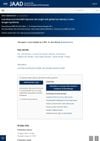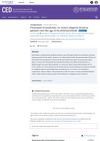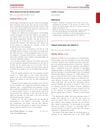 April 2024 in “Expert opinion on investigational drugs”
April 2024 in “Expert opinion on investigational drugs” JAK inhibitors are safe and effective for treating moderate-to-severe alopecia areata.
[object Object]  April 2024 in “Journal of the American Academy of Dermatology”
April 2024 in “Journal of the American Academy of Dermatology” Low-dose minoxidil helps hair grow longer and thicker in people with short anagen syndrome.
 February 2024 in “Journal of the European Academy of Dermatology and Venereology”
February 2024 in “Journal of the European Academy of Dermatology and Venereology” Baricitinib is effective and safe for long-term use in severe alopecia areata, improving hair regrowth and quality of life with few side effects.
 January 2024 in “Clinical and Experimental Dermatology”
January 2024 in “Clinical and Experimental Dermatology” Baricitinib helps treat severe hair loss in people over 65.
 January 2024 in “American journal of clinical dermatology”
January 2024 in “American journal of clinical dermatology” Ritlecitinib is safe and well-tolerated for treating alopecia areata in patients aged 12 and older.
 November 2023 in “Dermatology and Therapy”
November 2023 in “Dermatology and Therapy” Baricitinib treatment helps regrow eyebrow, eyelash, and scalp hair in severe alopecia areata, improving patients' emotional well-being and quality of life.
[object Object]  November 2023 in “Annales de dermatologie et de vénéréologie, FMC”
November 2023 in “Annales de dermatologie et de vénéréologie, FMC” Baricitinib effectively treats severe alopecia for up to 104 weeks.
 November 2023 in “Expert Opinion on Pharmacotherapy”
November 2023 in “Expert Opinion on Pharmacotherapy” Finasteride and dutasteride are effective in treating male hair loss but can cause sexual side effects and birth defects.
 September 2023 in “British Journal of Dermatology”
September 2023 in “British Journal of Dermatology” Hair regrowth from severe alopecia areata treatment with baricitinib can vary, with faster results in those with shorter hair loss duration.
 July 2023 in “Australasian Journal of Dermatology”
July 2023 in “Australasian Journal of Dermatology” The analysis found that alopecia areata, a hair loss condition, is not very common in Australia, affecting about 0.13% of people, with new cases most often seen in males aged 19 to 34 years.
 April 2023 in “Journal of the American Academy of Dermatology”
April 2023 in “Journal of the American Academy of Dermatology” Switching between the medications tofacitinib and baricitinib can be effective for treating hair loss in alopecia areata.
 April 2023 in “Expert opinion on pharmacotherapy”
April 2023 in “Expert opinion on pharmacotherapy” Birth control pills and antiandrogens are the most effective medicines for excessive body hair in women, but combining them with other treatments and psychological support is best.
 January 2023 in “Journal of The American Academy of Dermatology”
January 2023 in “Journal of The American Academy of Dermatology” Baricitinib helped most teenagers with severe hair loss regrow hair and had mild side effects.
ILC1-like cells may contribute to hair loss in alopecia areata and could be new treatment targets.
 September 2022 in “Journal of Investigative Dermatology”
September 2022 in “Journal of Investigative Dermatology” Patient-reported outcomes better reflect the quality of life impact of alopecia areata than traditional severity scores.
 April 2022 in “JAAD International”
April 2022 in “JAAD International” Women with frontal fibrosing alopecia have similar vitamin D levels to those with other hair loss types, suggesting vitamin D is not a key factor in this condition.
January 2022 in “Clinical Cases in Dermatology” An 11-year-old girl with severe hair loss was successfully treated with a new combination therapy.
 March 2021 in “Hair transplant forum international”
March 2021 in “Hair transplant forum international” Minoxidil helps hair growth.
 February 2021 in “Cureus”
February 2021 in “Cureus” A woman's hair loss was initially misdiagnosed as scarring hair loss but was actually a treatable autoimmune hair loss.
 July 2018 in “Elsevier eBooks”
July 2018 in “Elsevier eBooks” Telogen Effluvium is a common, usually reversible hair loss condition, often improved by removing the trigger and possibly treated with various products, though their effectiveness is uncertain.
September 2016 in “British journal of dermatology/British journal of dermatology, Supplement”  April 2016 in “Journal of Investigative Dermatology”
April 2016 in “Journal of Investigative Dermatology” Phenylephrine may help prevent hair loss from pulling on the hair roots.

No treatment alters the natural progression of alopecia areata, and effectiveness varies, with some possibly working better in children.
 July 2012 in “British Journal of Dermatology”
July 2012 in “British Journal of Dermatology” Women generally want more hair volume, which becomes a concern around menopause due to hair loss.
 July 2011 in “Hair transplant forum international”
July 2011 in “Hair transplant forum international” The document's conclusion cannot be determined from the provided text.
January 2023 in “Clinical and Experimental Dermatology” Oral minoxidil may help improve fragile hair.
January 2023 in “Australasian Journal of Dermatology” Sublingual minoxidil helped regrow hair in a person with congenital triangular alopecia.
August 2022 in “International Journal of Dermatology” Low-dose oral and sublingual minoxidil seem safe for children with hair disorders.
March 2022 in “Journal of The American Academy of Dermatology” December 2021 in “Faculty Opinions – Post-Publication Peer Review of the Biomedical Literature” Topical finasteride is promising for hair loss with minimal side effects but needs more research and approval.






















